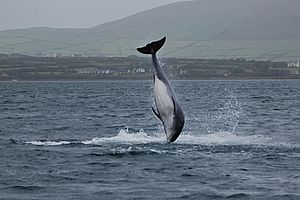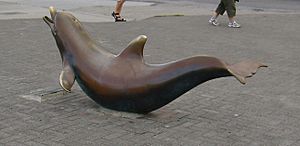Fungie facts for kids

Fungie in 2007
|
|
| Species | Common bottlenose dolphin (Tursiops truncatus) |
|---|---|
| Sex | Male |
| Born | Before 1980 |
| Years active | 1983–2020 |
| Known for | Interaction with humans, long life |
| Residence | Dingle harbour and nearby waters |
| Appearance | Triangular-shaped nick on dorsal fin |
| Named after | A local fisherman who was teased for his attempt to grow a beard, who was nicknamed "Fungus" |
| Awards | World's oldest solitary dolphin |
Fungie, also known as the Dingle Dolphin, was a famous male common bottlenose dolphin. He lived by himself in the waters near Dingle on the southwest coast of Ireland. Fungie was special because he enjoyed being close to humans.
Contents
Discovering Fungie's Amazing Life
Fungie was first seen in Dingle harbour in 1983. He stayed there for 37 years, until October 2020. This was a very long time for a dolphin to live in one place!
How Long Do Dolphins Live?
Most wild bottlenose dolphins live between 8 and 17 years. Some have been known to live much longer, even up to 67 years. When Fungie disappeared, he was thought to be at least 40 years old. This made him one of the oldest dolphins known.
A World Record Holder
In 2019, Guinness World Records officially named Fungie the oldest solitary wild dolphin in the world. Being "solitary" means he lived alone, without other dolphins.
Fungie's Friendly Nature
Fungie was known for being very playful with people. He would interact with swimmers, surfers, kayakers, and divers. People loved to visit Dingle just to see him!
A Unique Friendship
It is rare for wild dolphins to seek out human contact. Dolphins are social animals and usually live in groups. Fungie was the first dolphin in Ireland recorded to have such a positive relationship with humans in the wild. He was never aggressive towards people.
What Did Fungie Eat?
Fungie was often seen eating garfish. This was interesting because dolphins were not previously known to eat this type of fish.
Where Did Fungie Go?
In October 2020, people became worried when Fungie went missing for several days. He was last seen on October 13th. Marine experts believe he either moved to new waters or passed away. Any sightings reported after October 15th were thought to be mistaken.
 | Valerie Thomas |
 | Frederick McKinley Jones |
 | George Edward Alcorn Jr. |
 | Thomas Mensah |


